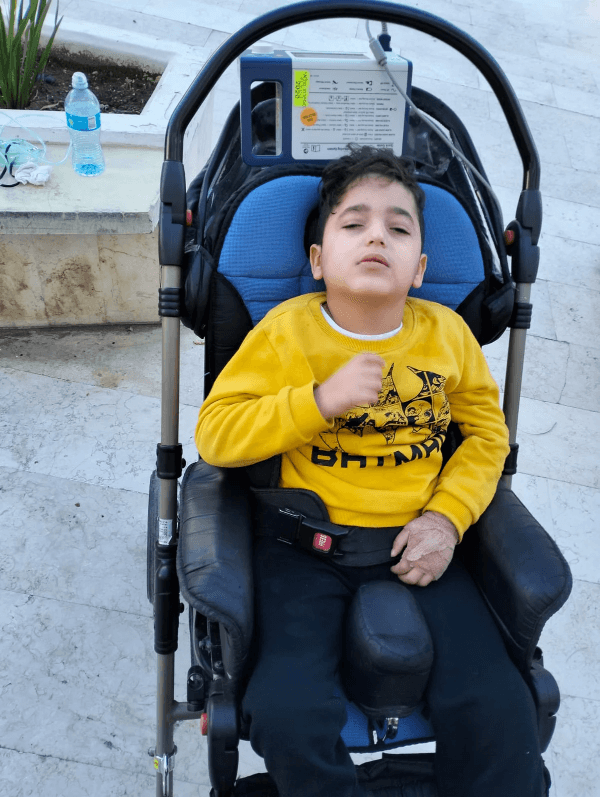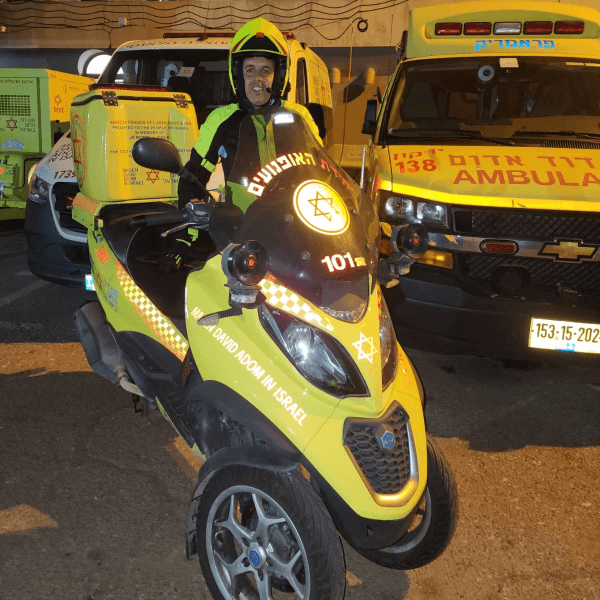I was recently asked to speak on Rosh Hashana in my synagogue to share my experiences serving in the IDF and what I've learned from them that might resonate with our community. The response was so meaningful that I wanted to adapt and share these thoughts more broadly. Here is a version that was adjusted slightly for this blog.
This past Saturday night, I had the privilege of driving with a fellow soldier named Yisroel for twenty minutes each way to pick up pizzas for our base for Melave Malka. In those forty minutes of conversation, I learned about a man whose story embodies everything I've come to understand about purpose, sacrifice, and what it truly means to serve something greater than yourself.
Before October 7th
Yisroel was a successful contractor who employed twenty-five Arab workers. He's also a MADA volunteer medic with four children at home, including his youngest - an eight-year-old special needs child confined to a wheelchair who can only communicate through a special computer. This child requires constant attention and is taken by a family member to school each day for just a few hours.

Everything Changed
After October 7th, Yisroel faced an impossible moral dilemma. He couldn't in good conscience continue employing people he knew were celebrating the horrific acts committed against his people. So he made a decision that would cost him everything: he fired all twenty-five Arab employees and temporarily closed his business.
But Yisroel didn't stop there. He threw himself into service, driving ambulance shifts for MADA until they made him stop due to overwork. Then he started motorcycle duties, racing to emergency calls across the country.

The Search for Purpose
During his recovery, Yisroel slowly rebuilt his business, this time with Israeli and foreign workers. But despite his progress, he felt something was missing. The business was running, his family was taken care of, yet there was an emptiness - a sense that he wasn't doing enough during this critical time for Israel.
That's when he made perhaps his most surprising decision: he joined the IDF's shlav bet program.
At first glance, it seems almost ridiculous. Here's a man whose business is still ninety percent down from pre-war levels because he can't compete with contractors who still hire Arab workers. His special needs child requires enormous attention. His body is still recovering from serious injuries. Why would he choose to spend four of the last six weeks in training or on military base?
The answer reveals everything about what drives a person when they've found their true purpose.
Serving Despite the Cost
Yisroel wanted to get himself proper protective equipment - a helmet, vest, and ceramic plates - for his service near Gaza. But his wife won't let him buy them. Not because she doesn't support his service, but because their business simply can't afford it. When you're operating at ten percent of your former income, every shekel counts.
Yet there he was, driving with me to pick up pizzas for our base's Melave Malka, talking about his next training session with the same enthusiasm most people reserve for discussing their vacation plans.
More Than Just One Story
Yisroel isn't alone. I'm part of a WhatsApp group for the shlav bet program with hundreds of members from different backgrounds, ages, and levels of religious observance - but about ninety-five percent from the Charedi community. These are older men, married with young children, who are eager to join. Not just join - many are fighting for a spot. Even men over fifty who are told "no" keep pushing until they're eventually accepted.
I've served alongside fathers making incredible sacrifices: one who left basic training for eighteen hours to attend his son's wedding, a twenty-seven-year-old with a three-week-old baby who left his wife for three straight weeks, commanders whose children moved abroad and they couldn't even say goodbye properly.
One soldier asked his parents and in-laws to help watch his grandchildren while he was in training. When they learned about shlav bet, their response was devastating: "We no longer have a son, and you no longer have grandchildren. You are on your own."
These men face threats to their jobs, their businesses stop during service, their families are sometimes torn apart by their decision. The sacrifices are real and affect everyone they love.
Moments That Change Everything
There are two moments from my basic training that stood out to me, for different reasons.
First, in a conversation with one Charedi soldier, I asked him point blank: "If you don't believe in the army, why are you joining now?" His answer wasn't pro or anti-army, but rather that he was taught that learning is their way of serving the country, just like some people do sherut. He was in yeshiva learning full-time for years.
But here's where he differed from others: while most believe their learning in yeshiva is a patur from the army, he viewed it as a deferment. As long as he was really learning, he was doing his work. But now that he's not in yeshiva full-time and can serve, he believes he has an obligation to draft and serve.
Unfortunately, social and communal pressures make this decision difficult for most. But here's a guy in his early thirties who truly understood that at each stage of his life, he has a purpose, and he's channeling that purpose for the community and greater good, despite great social cost.
My second powerful moment came during our visit to Yad Vashem and Har Herzl - a rite of passage for every soldier. We spent time in the section where soldiers who fell in the current war are buried, listening as members of our own unit shared about their friends laid to rest there.
But the moment that struck me was seeing three Charedi men - long payis, tzitzit out, big black kippot - standing over a grave after hearing about a fallen soldier, telling each other: "We had it wrong all along. These are the real tzadikim of Israel."
These men realized that being a person of purpose isn't just about learning - it's about being a person of action. And during this powerful moment, the first thing that popped into my head was the end of Rocky 4: "If I can change, and you can change, we all can change!"
The Bigger Picture
We serve at a logistics base near Gaza, providing security for those going in and out, giving combat soldiers a chance to join their units instead of guarding the base. People ask what guys like us are doing in the army. The truth is, we do make a difference. We replace someone with a family, giving them an extra break or Shabbos off. Many younger soldiers are using this as a stepping stone to become combat soldiers and replace others.
But there's something deeper happening here that goes beyond military necessity.
Finding Purpose in Crisis
A high school friend once told me something profound: "Marriage is like the news. Ninety-five percent of it is good - even amazing - but we focus on the five percent that's bad, because that's what gets attention."
In these difficult times, it's easy to focus on the divisions, the arguments, the seemingly insurmountable challenges facing Israeli society. But stories like Yisroel's remind us to look at what's actually happening on the ground.
Here's a man who lost his livelihood standing up for his principles, nearly lost his life serving others, and still found a way to give more. Not because someone forced him to, not because of social pressure (quite the opposite), but because he understood that at each stage of his life, he has a purpose.
The Ripple Effect
As in that line from Rocky, it starts with "I" - what is my purpose, what can I do, how can I change?
Think about Yisroel, sacrificing his business and livelihood to stand up for his principles, then joining the army despite financial hardship. Think about that Charedi soldier, going against social pressure to serve when his life circumstances changed. Think about those three men at Yad Vashem, changing their entire worldview in a single powerful moment.
Then "you" - someone sees what you did and you inspire them to change and make an impact.
Individual acts of purpose create communal transformation. When someone like Yisroel makes these sacrifices, it inspires others. Each person who steps up inspires others to inquire, to join, to act. I'm proud to say that at least one person joined the program because of my example, and another signed up for the next training.
And finally "we" - the communal effect of these changes.
This isn't about everyone making the same choice, but about embracing change, shifting our perceptions, and most importantly, aligning our values so we can come together as a community.
What We Can Learn
Yisroel's story teaches us that purpose isn't about grand gestures or dramatic moments. It's about looking at each stage of your life and asking: What can I do right now, given my circumstances, to serve something greater than myself?
For Yisroel, it meant giving up his workforce and rebuilding from scratch. It meant serving as a medic despite personal risk. It meant joining the army despite financial hardship and family obligations.
For others, it might mean something completely different - collecting challot for soldiers, organizing supplies for bases, supporting families of soldiers, or countless other acts of service that strengthen our community during these challenging times.
Looking Forward
These past few years have been an incredible journey that none of us wanted. We often get so fixated on the difficult experiences that we forget the end game. Whether it was fighting about masks during corona, debating judicial reform, or disagreeing about war policies, we sometimes lose sight of our shared goals: protecting our people, bringing our hostages home, and building a society where everyone can thrive.
But people like Yisroel remind us that even in the darkest times, there are those who step forward, who find their purpose, who choose to serve despite the cost.
When individual purposes align toward communal needs, something powerful happens. Our efforts become unified. Our hope multiplies. Our strength grows.
That's what we're witnessing in programs like shlav bet, in organizations like Smiles for Chayalim, and in countless acts of service happening across Israel every day.
As we move forward, may we all find our own ways to serve, our own sense of purpose, and our own opportunities to transform individual action into communal strength.
Sometimes purpose finds us in the most unexpected places - even in a twenty-minute drive to pick up pizzas on a Saturday night.
If you'd like to support soldiers like Yisroel and the many others serving our country, visit https://www.smilesforchayalim.com/support-us

